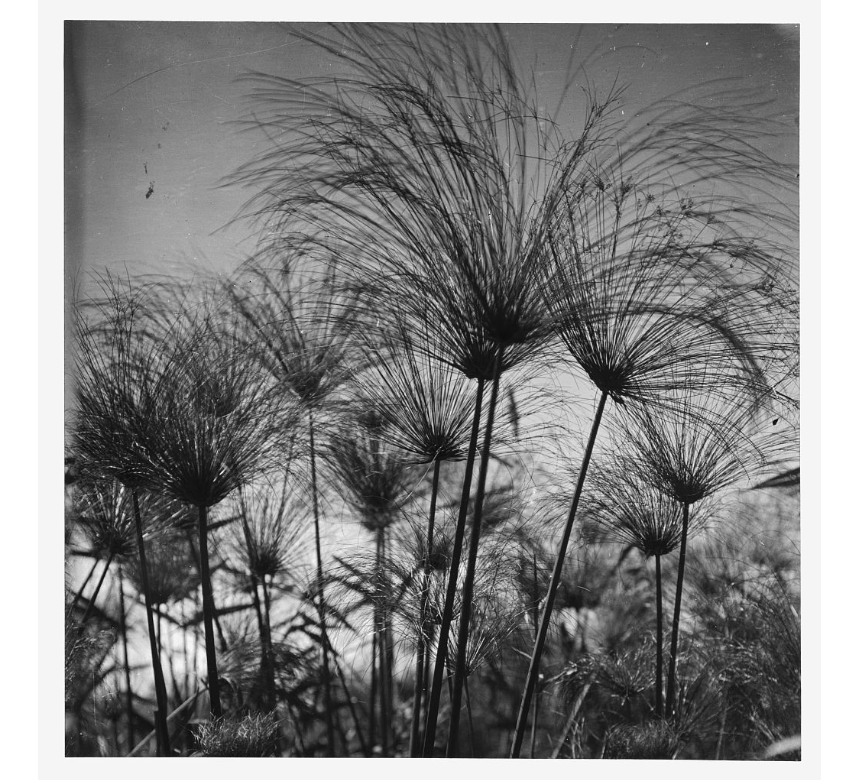Answers about
paper in the Bible
also known as: papyrus —meaning: a sheet of paper made of papyrus strips
Greek: χάρτης —transliteration: chartés (chartes) —meaning: a sheet of writing material, paper
In 2 John, the Greek word for “paper” is used.
Though I have many things to write to you, I do not want to do so with paper [chartés] and ink; but I hope to come to you and speak face to face… —2 John 1:12 excerpt
This paper was manufactured from papyrus, and hence its name. The papyrus (Hebrew: gome) is a kind of bulrush. It is mentioned by Job and Isaiah (Isa. 35:7).
Can the papyrus [גֹּמֶאִ = gome] grow up without a marsh? Can the rushes [gome] grow without water? —Job 8:11
…grass and reeds and papyrus will grow. Isaiah —Isaiah 35:7b NIV

In Israel, the marshes at the northern end of Lake Merom were known for their papyrus reeds.
Cyperus papyrus (aka papyrus, papyrus sedge, paper reed, or Nile grass) grows in full sun, in wet swamps and on lake margins throughout Africa, the Mediterranean countries and Madagascar, where it is native in the wild. In more recent years it was introduced to tropical regions worldwide.
Papyrus is an ancient writing material made from the pith (inner stem) of the Cyperus papyrus plant, a tall reed that grew abundantly along the Nile River in Egypt. It was the dominant paper of the ancient Mediterranean world from around 3000 BC until roughly the 8th–10th centuries AD, when it was gradually replaced by parchment and then wood pulp paper (invented in China).
Alexandria, Egypt, was an export hub for papyrus.
How papyrus paper was made (quick version)
- Strips were cut from the plant’s triangular stem.
- Strips were laid side-by-side in two overlapping layers (horizontal + vertical).
- The sheet was pounded, pressed, and dried—natural plant sugars acted as glue.
- Multiple sheets were glued end-to-end to form long scrolls (up to 30–40 feet) or cut into smaller codex pages (early book format).
Papyrus paper was lightweight, flexible, and relatively cheap to produce in Egypt, making it ideal for letters, legal documents, literature, and—crucially—religious texts.
The longest papyrus scroll ever found is over 130 feet (Egyptian Book of the Dead).
History
Papyrus was used for many purposes: paper, material for woven mats, coverings for huts, etc.
The Bible as we know it today was not original written on modern paper or vellum, but largely on papyrus in its earliest surviving forms.
The original Hebrew scrolls were written on papyrus or leather/parchment. The Dead Sea Scrolls (discovered 1947–1956) are currently the oldest known biblical manuscripts (3rd century BC – 1st century AD). Most are on parchment (animal skin), but some fragments are on papyrus.
Example: Papyrus fragments of Exodus, Leviticus, and Deuteronomy were found in Qumran Cave 7.
Everyday copies of the Hebrew scriptures used in ancient Jewish communities (especially in Egypt) were often on papyrus because it was cheaper.
Almost all of the earliest New Testament manuscripts are on papyrus. These are called “papyri”. Over 140 papyrus manuscripts of the New Testament have been cataloged, mostly from Egypt, preserved for 2,000+ years in the dry desert (unlike humid Europe). Egypt had a large early Christian population; some of their worn and discarded texts have been discovered buried in trash heaps (midden).
From Scroll to Codex
Early biblical texts were scrolls (one long roll) of paper. By the 2nd–4th centuries AD, Christians began using the codex (bound book format)—made of papyrus sheets folded and stitched together.
The papyrus plant (Cyperus papyrus) became extinct in Egypt and was later reintroduced in the late 1800s). The unaccountable disappearance of this plant from Egypt was foretold by Isaiah (Isaiah 19:6-7) as a part of the divine judgment on that land.
The papyrus reeds [“bulrushes” —NASB] by the River, by the mouth of the River,
And everything sown by the River,
Will wither, be driven away, and be no more. —Isaiah 19:6-7 NKJV
Shift from papyrus to parchment
- Papyrus = plant-based, brittle over time, tears easily
- Parchment/vellum = animal skin, durable, reusable (palimpsest)
- By the 4th century AD, major Bible codices like Codex Sinaiticus and Codex Vaticanus were written on parchment, not papyrus.
- Papyrus fell out of use after Islamic conquests cut off Egypt’s supply (about 7th–8th century AD).
More information
- Answers about writing in Biblical times
- WRITING—Is there any confirmation of Biblical events from written sources outside the Bible?
- About handwriting in the Bible
- bulrush
- rush
- What is parchment? and what part does it play in biblical history?
- What is a book and what does Scripture say about them?
- scrolls, rolls
- What are scribes in the Bible?
- ink horn
- recorder
- Answers about the Ancient Hebrew language
- About the Syriac / Syriac Aramaic language
- About the Ancient Greek language
- About the Latin language
- Answers about plants of the Bible
- What is cuneiform writing?
- Answers about tablets in the Bible
- What are Epistles?
 Archaeology and the Bible, abundant evidence in support of the Bible. Discover answers to your questions about archaeology and biblical history.
Archaeology and the Bible, abundant evidence in support of the Bible. Discover answers to your questions about archaeology and biblical history.
1920-pd.jpg)
